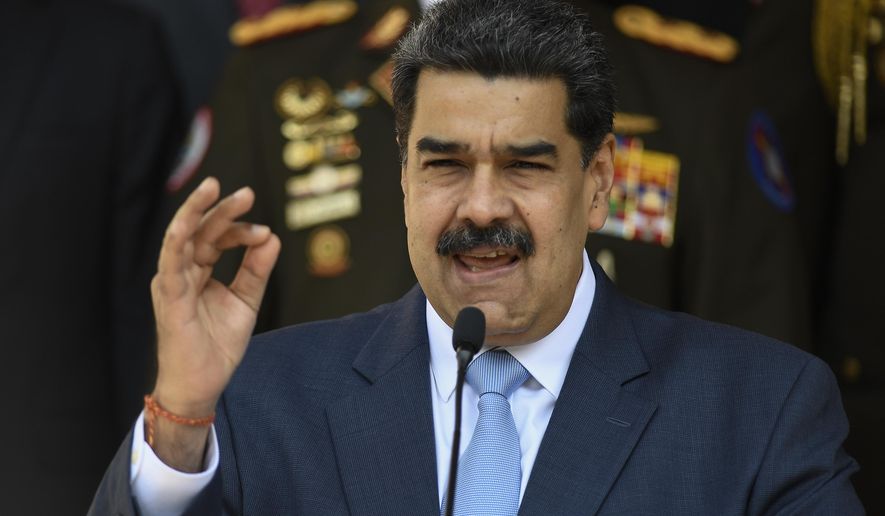Venezuelan socialist President Nicolas Maduro, his allies and security forces are guilty of “egregious” human rights violations, including arbitrary killings, torture and sexual violence, experts appointed by the United Nations’ top human rights agency concluded in a scathing review Wednesday.
Experts with the U.N.’s Human Rights Council called for additional criminal investigations to determine the severity of the violations since 2014 that they say have amounted to “crimes against humanity.”
The surprisingly severe findings added fresh fuel to the Trump administration’s flagging efforts to drive Mr. Maduro, a protege of the late, anti-U.S. populist President Hugo Chavez, from power. The U.S. and dozens of Latin American and European nations have called Mr. Maduro’s 2018 election illegitimate and are backing opposition leader Juan Guaido as the country’s rightful interim president.
The Trump administration’s special envoy to Venezuela, Elliott Abrams, told reporters in Washington that he hopes the “extraordinary” report will send a message to the European Union, which has been invited by Mr. Guaido to observe the country’s upcoming December elections, of the true nature of the regime in Caracas.
“We are not used to seeing so tough reporting coming from the U.N.,” Mr. Abrams said.
For his part, Mr. Guaido tweeted that the highly critical report “clears any doubt: Maduro is a criminal who, in addition to supporting drug trafficking and terrorism, commits crimes against humanity.”
“It is a great advance and moves the board in favor of our fight for freedom and justice for the victims,” he added.
The three-member fact-finding group appointed by the Human Rights Council concluded there were “reasonable grounds to believe” that Mr. Maduro, his interior and defense ministers and the head of Venezuela’s intelligence and security services have ordered or contributed to the torture and detention of critics of the socialist government, and were involved in extrajudicial killings as well.
“The mission found reasonable grounds to believe that Venezuelan authorities and security forces have since 2014 planned and executed serious human rights violations, some of which — including arbitrary killings and the systematic use of torture — amount to crimes against humanity,” Portuguese human rights lawyer Marta Valinas, who chaired the panel, said in a statement.
Ms. Valinas told reporters that the acts were directly tied to Maduro government policies — “one to quash opposition to the government and another to combat crime, including by eliminating individuals perceived as criminals.”
Ms. Valinas said the panel also believes that the crimes “were committed as part of a widespread and systematic attack against the civilian population,” and in the majority of the killings there were no prosecutions of security officials.
“At no stage have officials with command responsibility been brought to justice,” the report summary said.The report, which was commissioned by the council last year, was released roughly a year after a report authored by the council’s chief Michelle Bachelet chronicled a “pattern of torture” under Mr. Maduro’s government, including arbitrary detention, a “shockingly high” number of extrajudicial killings, sexual violence and enforced disappearances.
“President Maduro and the ministers of the interior and of defense were aware of the crimes,” a summary of the report said. “They gave orders, coordinated activities, and supplied resources in furtherance of the plans and policies under which the crimes were committed.”
Despite a pressure campaign and economic embargo largely organized by the Trump administration, as well as a domestic humanitarian crisis that has sent living and public health standards plunging, Mr. Maduro has stubbornly clung to power over the past two years. U.S. efforts to entice the Venezuelan military to abandon the regime have so far failed to produce fruit.
The regime has also been bolstered by economic and military support from China, Russia, Turkey and Iran.
The Maduro government criticized the formation of the fact-finding team and did not allow its members entry into Venezuela. The government did not issue an immediate response Wednesday, but will have a chance to comment when the report is presented to Human Rights Council members next week.
Separately, Mr. Abrams gave the first official U.S. response to the arrest in Caracas of what government officials said was an American spy planning terrorist attacks. Mr. Abrams said the U.S. government “did not send” Matthew John Heath to Venezuela.
• Lauren Toms can be reached at lmeier@washingtontimes.com.




Please read our comment policy before commenting.